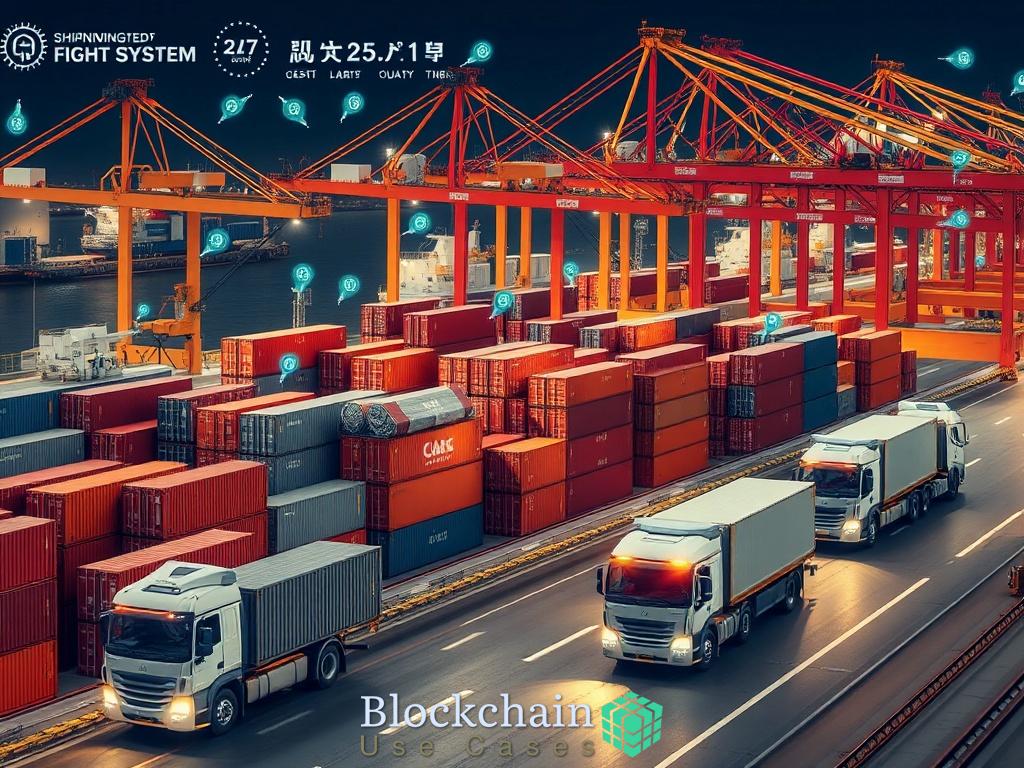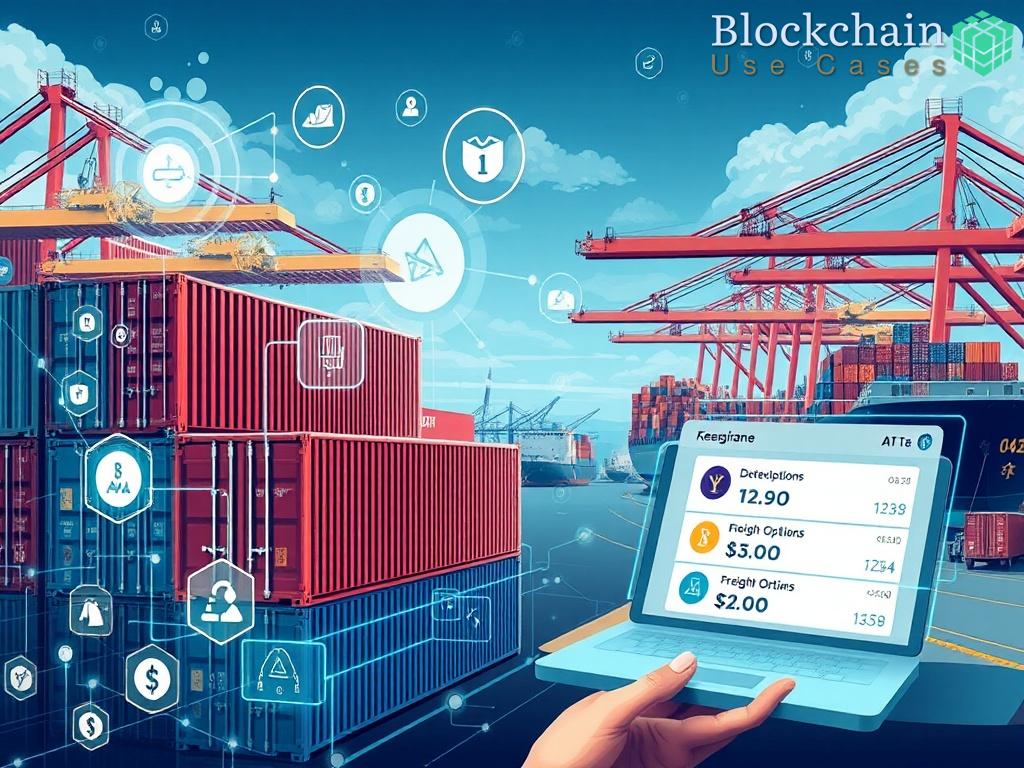Understanding Tokenization in Freight Capacity
In recent years, the freight industry has witnessed significant changes propelled by technological advancements. One such innovation is the tokenization of freight capacity, a process that not only streamlines operations but also enhances transparency and security in transportation booking systems. As traditional methods become increasingly inefficient, tokenization emerges as a solution that could redefine how freight is managed, booked, and executed.
At its core, tokenization involves converting real-world assets into digital tokens that can be easily transferred, tracked, and traded on a blockchain. This process offers a myriad of benefits over conventional freight booking systems, including improved efficiency, reduced fraud, and increased accessibility for shippers and carriers alike. By employing smart contracts and decentralized ledgers, tokenization ensures that all parties involved have access to real-time data, thus facilitating better decision-making.
| Benefit | Description |
|---|---|
| Enhanced Security | Tokenization reduces the risk of fraud by ensuring that all transactions are recorded on a secure blockchain. |
| Increased Transparency | All participants in a transaction can view the same data, promoting trust among shippers and carriers. |
| Operational Efficiency | Automated processes via smart contracts reduce the time and costs associated with traditional booking methods. |
The implications of tokenized freight capacity extend far beyond mere operational improvements. For stakeholders, this innovative approach represents a shift in how businesses interact within the supply chain. Shippers can now access a broader range of carriers, while carriers can optimize their capacity utilization by trading excess freight space. This democratization of freight booking not only fosters competition but also drives down costs, ultimately benefiting consumers.
Additionally, as the industry moves towards sustainability, tokenization can play a crucial role in tracking the carbon footprint of shipments, allowing companies to make more environmentally conscious choices.
Benefits of Tokenized Freight Systems

The transformation brought by tokenized freight systems offers substantial benefits that reshape the landscape of transportation booking. As the industry evolves, stakeholders are increasingly recognizing the advantages that arise from adopting this innovative approach. The following exploration highlights key benefits that make tokenized freight systems a compelling choice for modern logistics.
Tokenized freight systems significantly enhance operational workflows. By utilizing blockchain technology, the booking process becomes more intuitive and less prone to errors. The integration of smart contracts automates many aspects of freight transactions, which results in shorter processing times. This means that shippers can secure capacity more rapidly, while carriers can manage their fleets with greater agility.
One of the most appealing aspects of tokenized freight systems is the potential for cost reduction. By eliminating intermediaries and reducing administrative overheads, companies can lower their transaction costs. Moreover, the increased competition fostered by broader access to freight options allows shippers to negotiate better rates, thus optimizing their logistics budgets.
In an era where information is power, tokenization provides all stakeholders with access to real-time data. This transparency enables informed decision-making and enhances collaboration between shippers and carriers. By having the ability to track shipments continuously, stakeholders can respond promptly to any disruptions, thereby minimizing delays and improving service reliability.
In summary, the transition to tokenized freight systems presents an array of benefits that not only streamline operations but also foster a more competitive and efficient market. The ability to access real-time data, reduce costs, and improve operational workflows positions tokenization as a critical element in the ongoing evolution of the freight industry.
Challenges in Implementing Tokenized Solutions
The introduction of tokenized freight capacity undoubtedly presents transformative opportunities for the logistics and transportation sectors. However, the journey towards widespread adoption is not without its hurdles. As businesses contemplate integrating tokenization into their operations, they must navigate a landscape fraught with challenges that can impede progress and necessitate strategic planning.
One of the most significant challenges organizations face is ensuring that existing systems can effectively integrate with new tokenized solutions. Many companies operate on legacy systems that were not designed with blockchain technology in mind. Transitioning these systems to support tokenization requires substantial investment in both time and resources.
Moreover, the interoperability of different platforms poses another layer of complexity. With various stakeholders utilizing diverse technologies, establishing a cohesive ecosystem where data can flow seamlessly between systems is critical yet challenging. Companies must prioritize investments in technology that not only modernize their infrastructure but also allow for compatibility with peer systems.
The freight industry is heavily regulated, and the advent of tokenization introduces new compliance considerations. Regulatory bodies are still grappling with how to classify and govern digital assets within transportation. Businesses must ensure that their tokenized solutions comply with existing laws and regulations, which can vary significantly across regions.
A lack of standardized regulations may cause confusion and hesitation among stakeholders. To navigate this uncertainty, companies must engage with legal experts and policymakers to advocate for clear and supportive regulatory frameworks that can accommodate tokenization while safeguarding industry integrity.
Even with compelling benefits, the transition to a tokenized system may encounter resistance from various stakeholders, including shippers, carriers, and regulatory entities. Many individuals are wary of adopting new technologies due to perceived risks, lack of understanding, or fear of change. This resistance can stem from concerns regarding data security, the reliability of blockchain technology, or the potential for operational disruptions during the transition.
To overcome these obstacles, stakeholders must engage in comprehensive education and outreach efforts. Demonstrating the benefits of tokenization through pilot programs and success stories can help build trust and encourage broader acceptance across the industry.
In summary, while the promise of tokenized freight capacity is immense, the path to implementation is laden with challenges. By addressing technological integration, regulatory compliance, and stakeholder resistance, businesses can pave the way for a successful transition that unlocks the full potential of this innovative approach to transportation booking.
Impact on Supply Chain Efficiency
In an era where supply chain efficiency is paramount, the tokenization of freight capacity emerges as a game-changer. By integrating blockchain technology within freight operations, companies can significantly streamline their workflows. This transformation not only reduces redundancy but also enhances the speed of transaction processing, leading to more agile supply chains. The automation of processes through smart contracts plays a vital role in minimizing manual interventions, thus reducing the likelihood of human error.
Tokenization fosters an environment of enhanced collaboration among various stakeholders in the supply chain. With real-time data accessibility, shippers, carriers, and logistics providers can work together more effectively. This collective intelligence allows for swift decision-making, ultimately translating into improved service delivery and customer satisfaction. The ability to share insights and updates instantly helps to mitigate risks associated with delays or disruptions, ensuring that operations run smoothly.
The impact of tokenized freight systems extends beyond immediate operational improvements. Here are some key benefits that highlight how tokenization contributes to supply chain efficiency:
- Reduction in Operational Costs: Minimizing intermediaries leads to lower transaction costs, allowing businesses to allocate resources more effectively.
- Increased Speed of Transactions: Blockchain technology accelerates booking and invoicing processes, reducing lead times significantly.
- Enhanced Visibility: Continuous tracking of shipments enables stakeholders to monitor progress and manage potential disruptions proactively.
- Scalability: Tokenized systems can easily adapt to changing demands, ensuring that supply chains remain resilient in the face of fluctuations.
These advantages position tokenization as a pivotal element in redefining supply chain strategies, enabling companies to remain competitive in a rapidly evolving market.
Future Trends in Freight Capacity Tokenization
As the logistics industry continues to embrace digital transformation, the future of freight capacity tokenization is poised to redefine transportation booking systems. With an increasing reliance on blockchain technology and smart contracts, the landscape of freight logistics is evolving rapidly. Stakeholders are beginning to recognize the profound implications of tokenization not only for operational efficiency but also for strategic growth in the coming years.
Emerging technologies such as artificial intelligence (AI), the Internet of Things (IoT), and advanced analytics are set to play a crucial role in enhancing the functionality of tokenized freight systems. AI algorithms will analyze vast datasets to predict demand fluctuations, enabling shippers to adjust their strategies accordingly. Concurrently, IoT devices will provide real-time tracking and monitoring of shipments, contributing to a more transparent and responsive supply chain.
Furthermore, the integration of machine learning with tokenization will enable more accurate risk assessments, allowing stakeholders to make informed decisions regarding capacity utilization and pricing strategies. As these technologies converge, businesses will find themselves better equipped to navigate market volatility and respond to customer needs.
As tokenization continues to gain traction in the freight sector, regulatory bodies around the world are beginning to establish frameworks to govern the use of digital assets in transportation. This shift toward regulation is crucial for fostering trust among stakeholders and ensuring compliance with international trade laws. The establishment of a standardized regulatory environment will not only mitigate risks associated with fraud but also encourage broader adoption of tokenized systems.
Moreover, collaborative efforts among industry leaders, policymakers, and technology providers are essential for creating interoperable platforms that facilitate seamless data exchange. The development of common protocols will ensure that various systems can communicate effectively, ultimately enhancing the overall efficiency of freight operations.
Another significant trend in the future of tokenized freight capacity is the focus on sustainability. With an increasing emphasis on corporate responsibility, shippers and carriers are exploring ways to minimize their environmental impact. Tokenization can facilitate this by enabling the tracking of carbon emissions throughout the supply chain. By utilizing digital tokens to represent eco-friendly shipping practices, companies can incentivize sustainable behavior while transparently reporting their environmental footprint.
Additionally, this shift toward sustainability is likely to drive innovation in the logistics sector, leading to the development of greener technologies and practices. As consumers become more environmentally conscious, the demand for sustainable solutions will only continue to grow, and tokenization will be at the forefront of this transformation.





